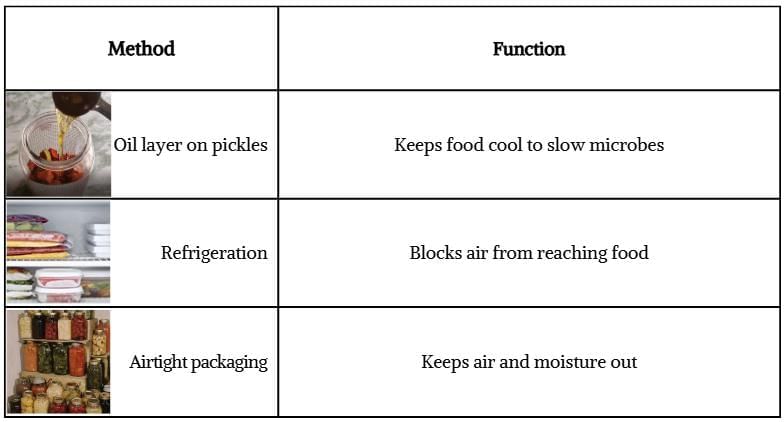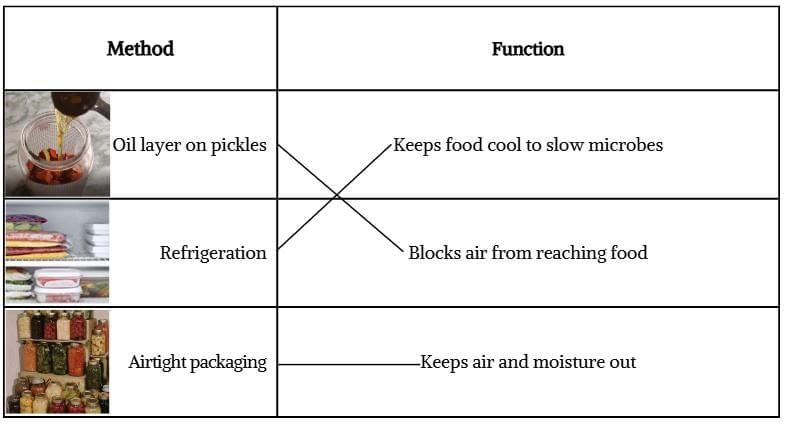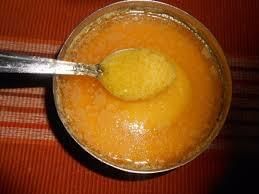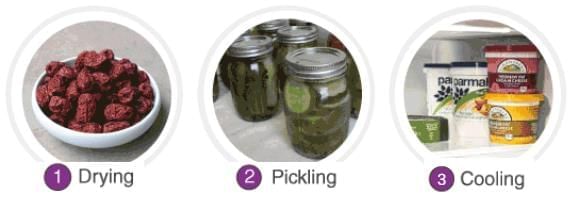Unit Test (Solutions): The Mystery of Food | Our Wondrous World Class 5 - New NCERT PDF Download
Time: 45 Minutes
M.M.: 20
Attempt all questions.
Question numbers 1 to 6 carry 1 mark each.
Question numbers 7 to 9 carry 3 marks each.
Question number 10 carries 5 marks.
Q1. Which tiny living things cause coloured patches (mould) on spoiled food like bread or uttapam?
(a) Dust particles
(b) Microbes
(c) Vitamins
(d) Minerals
Ans: (b) Microbes
Q2. Fill in the blanks:
Microbes grow faster on food when there is enough ______, ______, and suitable ________.
Ans: moisture, air, temperature
Q3. True or False:
Keeping food in the refrigerator slows down the growth of microbes.
Ans: True
Q4. Name the method in which food like chillies is kept in the sun to remove water and prevent spoilage.
Ans: Drying
Dried Fruits
Q5. Match the following:
Ans:
Q6. Which of these foods generally does NOT need refrigeration because water has been removed?
(a) Milk
(b) Butter
(c) Ghee
(d) Fresh curd
Ans: (c) Ghee
Q7. List any three food preservation methods from the chapter and briefly explain how each works.
Ans: Three food preservation methods from the chapter:
1. Drying/Dehydration: Removes moisture so microbes cannot grow.
2. Oiling/Pickling: Oil forms a barrier that keeps air away, preventing microbial growth.
3. Refrigeration/Freezing: Low temperature slows microbial activity and keeps food fresh longer.
Q8. Why do pickles stay good longer than a slice of bread left outside? Give three reasons linked to conditions needed by microbes.
Ans: 1. Oil covers pickles and keeps air away, so germs can’t grow easily.
2. Pickles have less water for microbes to use, unlike bread, which is moist.
3. Salt and spices in pickles make it hard for germs to live, but bread gives germs air, water, and a cosy temperature.
Q9. Aditya had indigestion after eating fair food. Suggest three safe practices to prevent and manage indigestion using ideas from the chapter.
Ans: Safe practices to prevent and manage indigestion:
1. Eat fresh, properly stored food; avoid stale or uncovered street food.
2. Have curd or buttermilk with good microbes to support digestion.
3. If symptoms are severe or persist, visit a doctor for treatment.
Q10. Disha wants to explain how idlis become soft and how to keep the batter safe.
(a) Draw and label a simple flow diagram: b) Explain in 3–4 points how good microbes help make idlis soft.
b) Explain in 3–4 points how good microbes help make idlis soft.
(c) Write one safe storage tip for idli batter before cooking.
Ans: (a) Student diagram should show and label: batter, fermentation (gas produced), fluffy batter, steamed idlis.
(b) How Good Microbes Help Make Idlis Soft (3–4 Points):
- Helpful germs in the batter make tiny gas bubbles.
- These bubbles make the batter light and puffy.
- Steaming the puffy batter makes idlis soft and spongy.
- The germs also make idlis tastier and easier to digest.
(c) Safe Storage Tip: Keep the batter in a covered container in the fridge after it gets puffy to stop germs from spoiling it.
|
11 videos|211 docs|10 tests
|
FAQs on Unit Test (Solutions): The Mystery of Food - Our Wondrous World Class 5 - New NCERT
| 1. What is the importance of food for living organisms? |  |
| 2. Can you explain the different food groups and their roles? |  |
| 3. How do plants obtain their food? |  |
| 4. What are the consequences of a poor diet? |  |
| 5. How can we promote healthy eating habits in children? |  |

























